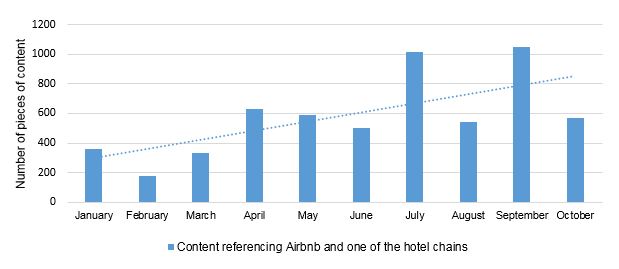Is Airbnb a genuine competitor to hotels?
The sharing economy presents alternatives to traditional service providers but has also been challenged by governments and regulatory bodies that question these businesses’ compliance around safety and the law.
Airbnb has recently grown as a P2P player in the travel accommodation space. And while traditional hotel chains have historically insisted that Airbnb is not a direct competitor as the service it provides is fundamentally different from the amenities and management in traditional chains, Airbnb achieved a higher market valuation than several large hotel chains this summer. Moreover, Airbnb’s recent partnership with Concur has made it clear that the firm is aiming to poach business travellers from hotels that have historically counted these customers among their most loyal guests.
Recently, several of alva’s clients in the hospitality sector have been left wondering if Airbnb might represent genuine competition.
alva has quantified the rise to prominence of Airbnb and measured how often this company is mentioned alongside hoteliers including Hilton, Marriott, IHG, AccorHotels and Starwood. To do this, our content analytics reviewed all publicly availably content from January to October 2015, totalling 850,000 articles, tweets and posts.
The key findings were:
- Content referencing traditional hotel chain brands and Airbnb has risen since January. This indicates that even if a direct comparison is not made between Airbnb and a particular chain, these two entities are being increasingly discussed within the same context.
- Events that generated spikes in content volumes around hotels and Airbnb tended to relate to funding for Airbnb and sharing economy peers, partnerships with tech firms like Concur and Uber and media coverage of Airbnb as a challenger to hotels.
- The investment community and media commentary were the two biggest stakeholders sources of content comparing Airbnb to traditional players, with the latter largely unfavourably depicted by these audiences. Regulatory discussion was mixed and inconsistent, while direct customer comparisons between the two were relatively infrequent.

Figure I: Volume of coverage mentioning Airbnb and one of the hotels tracked over time
Coverage mentioning a traditional hotel chain alongside Airbnb first peaked in July, when Airbnb moved to “poach” business travellers from traditional hotel chains through a partnership with Concur. Two months later, AccorHotels’ COO claimed that Airbnb was not a competitor for the chain, though AccorHotels introduced initiatives to improve its F&B – framed by the media as an effort to compete with Airbnb – the following month.
So is Airbnb competition?
From the regulatory perspective, probably not. Inconsistent regulatory responses globally have focused on the impact on local communities, safety and liability – and just over a quarter of the content analysed mentioned Airbnb’s relationship with regulators.
In July, US media urged investors not to “check out” of Marriott even though it had just been trumped by Airbnb in terms of market value ($25bn). The article argued that Marriott’s asset-light approach to growth (given that many of its properties are owned by lodging trusts) may make it a more stable long-term investment than “nimble upstart” Airbnb, where rental owners are not tied into long-term contracts and can delist properties at any time.
However, this storyline was rare – more prevalent was journalists portraying traditional hotel chains as lumbering, out of touch giants facing competition from disruptors. Over 10% of content analysed referenced Airbnb’s market valuation as having surpassed those of multiple traditional hotel chains this year, and 31% framed Airbnb as a direct competitor.
Therefore, from the investor and media perspectives, Airbnb is more likely to be considered as genuine competition – and it remains to be seen to what extent these two groups will inform consumer decisions about where to rest their heads.
This is an excerpt of a fuller analysis of the hotel and leisure sector as well as the impact of Airbnb on traditional players. Please contact us for further information on how reputation intelligence can identify risks and opportunities for your company.
Be part of the
Stakeholder Intelligence community








